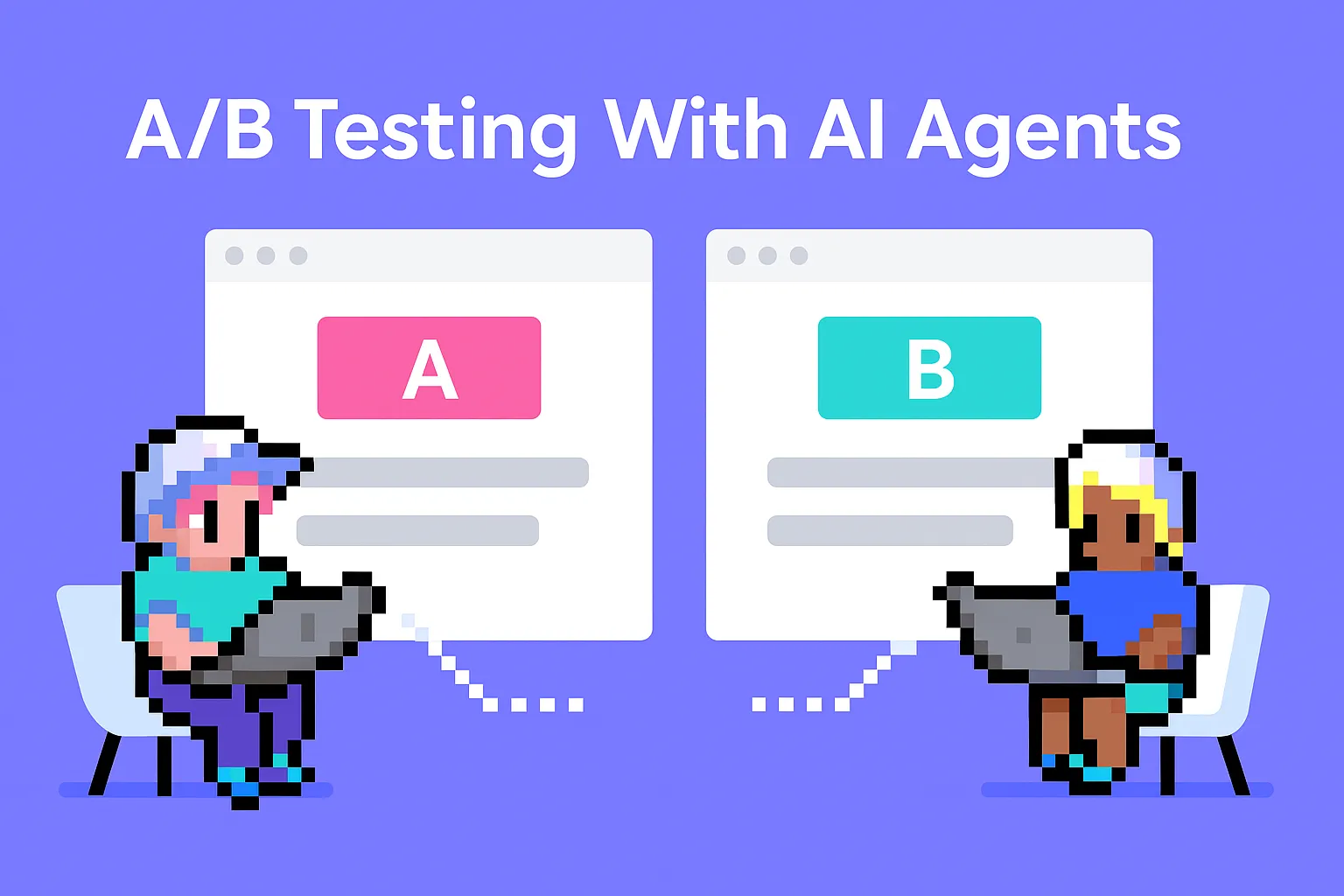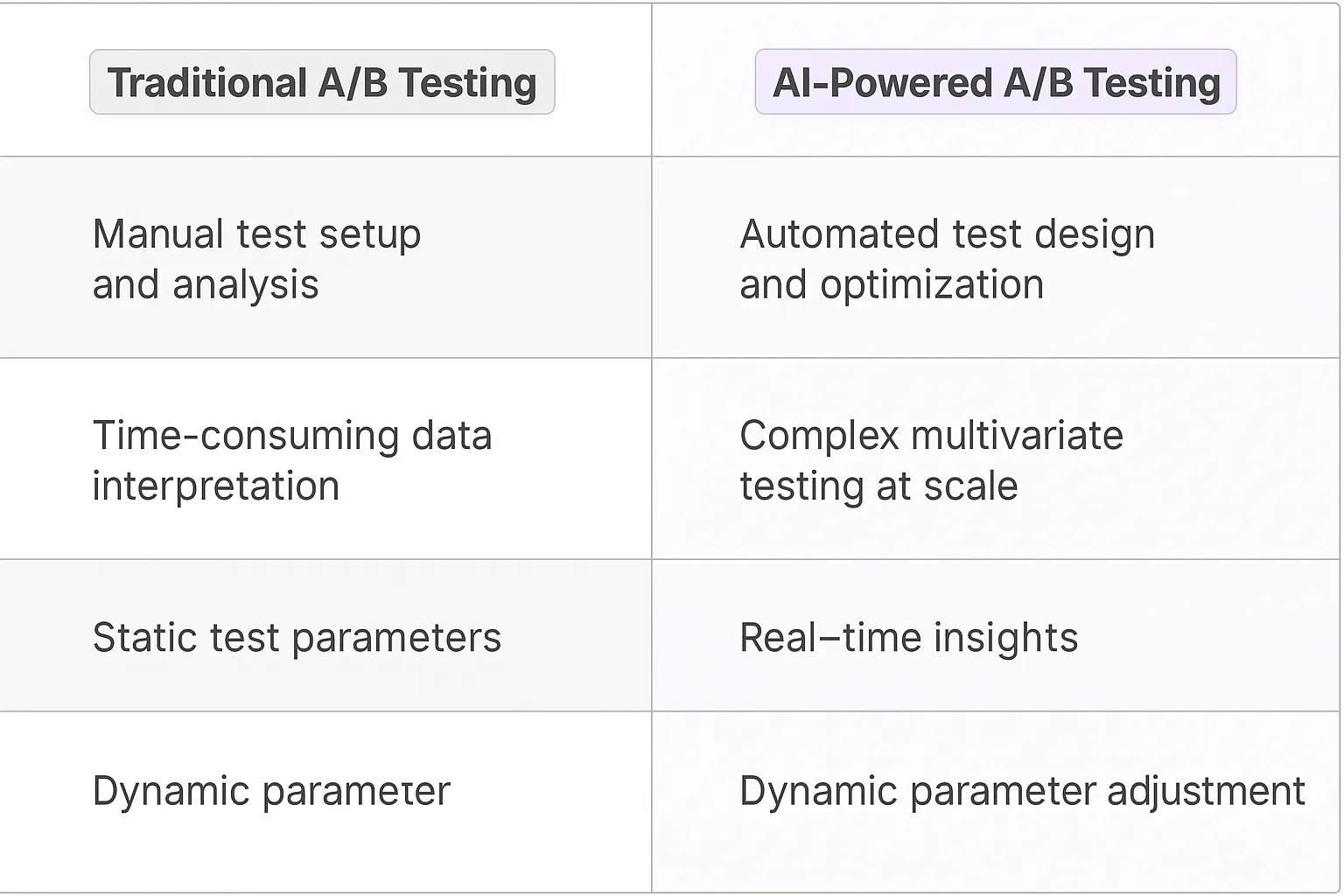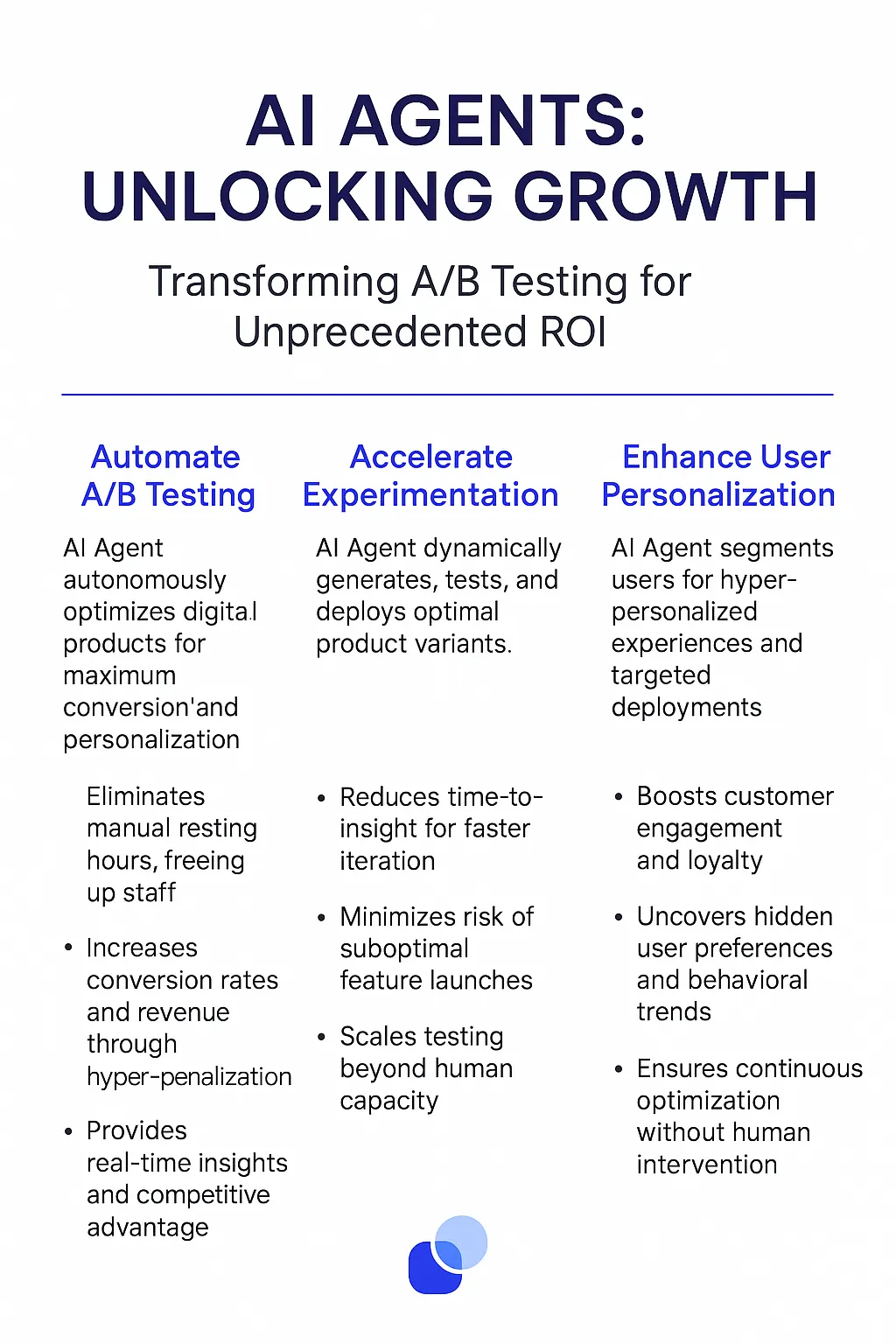A/B Testing AI Agents
The Fusion of A/B Testing and AI Agents
A/B testing is a method of comparing two versions of a webpage or app against each other to determine which one performs better. It's the digital equivalent of a scientific experiment where you're testing a hypothesis to see which variant yields better results. In the context of AI agents, A/B testing becomes a supercharged process where machine learning algorithms can conduct and analyze thousands of tests simultaneously, learning and adapting in real-time.
When powered by AI agents, A/B testing takes on a new dimension. Key features include:1. Dynamic test design: AI agents can adjust test parameters on the fly based on incoming data.2. Multi-variate capabilities: Testing multiple variables simultaneously to find optimal combinations.3. Predictive analytics: Using historical data to forecast potential outcomes of different variants.4. Personalization at scale: Tailoring experiences for individual users or micro-segments.5. Automated decision-making: Making split-second choices about which variant to serve based on real-time data.6. Pattern recognition: Identifying non-obvious correlations and insights that human analysts might miss.

Benefits of AI Agents for A/B Testing
What would have been used before AI Agents?
Before AI agents entered the A/B testing arena, we were stuck in a world of manual labor and guesswork. Teams would spend countless hours setting up tests, analyzing results, and iterating on hypotheses. It was like trying to solve a Rubik's cube blindfolded – possible, but painfully slow and inefficient.
Traditional A/B testing tools offered basic split testing capabilities, but they lacked the intelligence to adapt on the fly or provide nuanced insights. Marketers and product managers were left to interpret complex data sets, often leading to analysis paralysis or, worse, misguided conclusions that could steer product development in the wrong direction.
What are the benefits of AI Agents?
Enter AI agents – the secret weapon in the A/B testing arsenal. These digital teammates are like having a team of data scientists, statisticians, and UX experts working 24/7 to optimize your product. Here's why they're a game-changer:
- Hyper-personalization at scale: AI agents can segment users with surgical precision, creating micro-cohorts that traditional methods would miss. This allows for tailored experiences that resonate on a deeply personal level, driving engagement through the roof.
- Real-time optimization: Unlike static A/B tests, AI agents continuously learn and adapt. They can adjust test parameters on the fly, ensuring that you're always serving the most effective variant to each user segment.
- Multi-variate testing on steroids: AI agents can handle complex multi-variate tests with ease, analyzing countless combinations of elements to find the optimal mix. It's like playing 4D chess while your competitors are still figuring out checkers.
- Predictive insights: These digital teammates don't just tell you what worked – they predict what will work. By analyzing patterns and user behavior, they can forecast the potential impact of changes before you even implement them.
- Automated decision-making: AI agents can make split-second decisions on which variant to serve, based on real-time data and user context. This level of responsiveness was simply impossible with traditional A/B testing methods.
- Uncovering hidden opportunities: AI agents excel at identifying non-obvious correlations and patterns. They might discover that users who engage with feature X are 3x more likely to convert when shown variant Y – insights that could easily slip through the cracks of manual analysis.
The bottom line? AI agents are transforming A/B testing from a blunt instrument into a precision tool. They're not just improving conversion rates; they're reshaping how we think about product optimization and user acquisition and retention. In the high-stakes game of user acquisition and retention, AI-powered A/B testing isn't just an advantage – it's quickly becoming table stakes.

Potential Use Cases of AI Agents with A/B Testing
Processes
A/B testing is a crucial process for optimizing digital experiences, but it's often time-consuming and complex. AI agents can transform this landscape, making A/B testing more efficient and insightful. These digital teammates can analyze vast amounts of data, identify patterns, and generate hypotheses at a scale that would be impossible for human teams alone.
One key process where AI shines is in the continuous optimization of test designs. Instead of running a single test and calling it a day, AI agents can dynamically adjust test parameters based on real-time results. This creates a feedback loop that constantly refines the testing process, leading to more accurate and actionable insights.
Another process ripe for AI intervention is multivariate testing. Traditional A/B tests often focus on a single variable, but real-world scenarios are rarely so simple. AI agents can manage complex multivariate tests, juggling numerous variables simultaneously and uncovering intricate relationships between different elements that human analysts might miss.
Tasks
When it comes to specific tasks, AI agents are game-changers in A/B testing. They can automate the generation of test hypotheses based on historical data and current trends. This not only saves time but also introduces an element of creativity that can lead to unexpected breakthroughs.
Data cleaning and preparation, often the most time-consuming part of A/B testing, can be handled effortlessly by AI agents. They can identify and correct data anomalies, ensure consistency across datasets, and prepare data for analysis in a fraction of the time it would take a human team.
Perhaps most importantly, AI agents excel at interpreting test results. They can quickly sift through mountains of data to identify statistically significant findings, spot subtle trends that might escape human notice, and even predict long-term impacts of different variations. This level of analysis allows teams to make data-driven decisions with unprecedented speed and confidence.
The integration of AI agents into A/B testing isn't just an incremental improvement - it's a paradigm shift. By automating routine tasks, enhancing analytical capabilities, and enabling more sophisticated testing strategies, AI agents are set to redefine what's possible in the world of digital optimization. As these technologies continue to evolve, we can expect to see even more innovative applications that push the boundaries of A/B testing and drive unprecedented growth for digital businesses.

Industry Use Cases: A/B Testing AI Agents in Action
The versatility of AI agents in A/B testing is reshaping how businesses approach experimentation and optimization. These digital teammates are becoming indispensable across various sectors, each leveraging their capabilities in unique ways. Let's dive into some industry-specific scenarios that illustrate how AI is transforming A/B testing workflows and processes.
From e-commerce giants fine-tuning their conversion funnels to media companies optimizing content engagement, AI agents are proving to be game-changers. They're not just tools; they're becoming integral team members, bringing a level of speed and precision to A/B testing that was previously unattainable. As we explore these use cases, you'll see how AI is pushing the boundaries of what's possible in data-driven decision making.
E-commerce: Optimizing Conversion with A/B Testing AI Agents
Let's talk about e-commerce. It's a brutal battlefield where every pixel matters and a 0.1% increase in conversion can mean millions in revenue. Enter A/B testing AI agents – the secret weapon that's about to change the game.
These digital teammates aren't just running simple A/B tests. They're conducting sophisticated multivariate experiments at scale, learning from each interaction, and adapting in real-time. Imagine an AI that can simultaneously test dozens of variables – from button colors to product descriptions to checkout flows – across millions of user sessions.
But here's where it gets really interesting: these AI agents don't just test predefined hypotheses. They generate their own ideas based on emerging patterns in user behavior. They might notice that users from a specific geographic region respond better to certain imagery, or that mobile users prefer a different layout entirely.
The result? A constantly evolving, personalized shopping experience that's optimized for each individual user. It's like having a million tiny stores, each one perfectly tailored to its specific customer.
And the best part? This isn't some far-off future. Companies like Stitch Fix are already using AI to personalize their entire business model. The next step is applying this level of AI-driven optimization to every aspect of the e-commerce experience.
So if you're in e-commerce and you're not looking into A/B testing AI agents, you're leaving money on the table. This isn't just an incremental improvement – it's a paradigm shift in how we approach online retail. The companies that get this right will dominate the next decade of e-commerce. The question is: will you be one of them?
Media Streaming: Personalizing Content with A/B Testing AI Agents
The streaming wars are heating up, and the battlefield is your living room. Netflix, Disney+, HBO Max - they're all vying for your attention, but who's going to win? The answer might just lie in A/B testing AI agents.
These digital teammates are transforming how streaming platforms serve content. It's not just about recommending shows anymore; it's about crafting a completely personalized viewing experience.
Think about it. Every time you log in, an AI agent could be running dozens of micro-experiments. Which thumbnail makes you more likely to click? What show description piques your interest? Should they autoplay trailers or keep things static?
But here's where it gets wild: these AI agents are learning in real-time, across millions of users. They're not just testing predefined variables; they're identifying patterns we humans might never spot.
Maybe they notice that sci-fi fans who also watch cooking shows are more likely to enjoy a certain type of documentary. Or that viewers who binge-watch on weekends prefer different content than weekday watchers. The possibilities are endless.
The result? A streaming experience that feels like it's reading your mind. You log in, and boom - there's exactly what you want to watch, presented in exactly the way that appeals to you most.
This isn't just about keeping you glued to the screen (although that's certainly part of it). It's about reducing churn in a hyper-competitive market. When your streaming service feels tailor-made for you, why would you ever cancel?
Companies like Netflix have been pioneers in this space, but we're just scratching the surface. As these AI agents get smarter, they'll start influencing content creation itself. Imagine an AI that can predict which types of shows will be hits before they're even made.
The streaming platforms that master this technology will dominate the next era of entertainment. They'll have lower customer acquisition costs, higher retention rates, and a content slate that's practically guaranteed to succeed.
So if you're in the streaming game, or really any content-driven business, A/B testing AI agents aren't just a nice-to-have. They're your secret weapon in the battle for eyeballs. The question is: are you ready to pull the trigger?
Considerations
Technical Challenges
Implementing A/B testing AI agents isn't a walk in the park. It's more like trying to teach a robot to dance salsa while juggling flaming torches. The first hurdle? Data quality. Your AI is only as good as the data it's fed, and in A/B testing, that data needs to be pristine. We're talking about eliminating bias, ensuring statistical significance, and dealing with the dreaded "cold start" problem.
Then there's the issue of real-time processing. A/B testing AI agents need to make split-second decisions, adapting on the fly. This requires some serious computational muscle and clever algorithms. It's like trying to predict the next move in a chess game, but the board keeps changing, and your opponent is a hyperactive squirrel.
Let's not forget about integration. Your A/B testing AI agent needs to play nice with your existing tech stack. It's like introducing a new player to a well-oiled sports team. They need to learn the playbook, understand the team dynamics, and not accidentally score for the opposition.
Operational Challenges
On the operational side, things get even spicier. First up: the human factor. Implementing an A/B testing AI agent isn't just a tech change; it's a cultural shift. You're essentially asking your team to trust a digital teammate with crucial decisions. It's like asking a seasoned chef to let a robot taste-test their signature dish.
Then there's the challenge of interpretation. AI agents can crunch numbers faster than a squirrel on espresso, but translating those insights into actionable strategies? That's where things get tricky. You need people who can speak both 'AI' and 'business' fluently.
Lastly, there's the ever-present specter of ethical considerations. A/B testing AI agents have the power to influence user behavior significantly. It's crucial to establish guardrails to ensure your digital teammate isn't accidentally turning into a digital manipulator. It's a delicate balance between optimization and respecting user autonomy.
Implementing A/B testing AI agents is a complex dance of technology, strategy, and ethics. It's not for the faint of heart, but for those who get it right, the payoff can be game-changing. Just remember, in this AI-powered A/B testing world, the 'A' stands for 'Awesome' and the 'B' stands for 'Buckle up, it's going to be a wild ride'.
The Future of Digital Optimization: AI-Powered A/B Testing
A/B testing with AI agents isn't just an incremental improvement - it's a paradigm shift. We're moving from a world of educated guesses and manual analysis to one of data-driven, real-time optimization at scale. This technology is democratizing the kind of sophisticated testing and personalization that was once the domain of tech giants with massive data science teams.
But here's the kicker: this is just the beginning. As AI continues to evolve, we'll see even more powerful applications. Imagine AI agents that can not only test and optimize, but also generate new design variants or content ideas based on learned patterns of user behavior. The possibilities are mind-boggling.
For businesses, the message is clear: ignore this trend at your peril. Those who master AI-powered A/B testing will have a significant competitive advantage. They'll be able to iterate faster, understand their users better, and create digital experiences that feel almost magically tailored to each individual.
The future of digital optimization is here, and it's powered by AI. The question isn't whether you'll adopt this technology, but how quickly you can get on board and start reaping the benefits. Because in the fast-paced world of digital business, if you're not continuously testing and improving, you're falling behind. And with AI-powered A/B testing, you have the tools to stay ahead of the curve.













